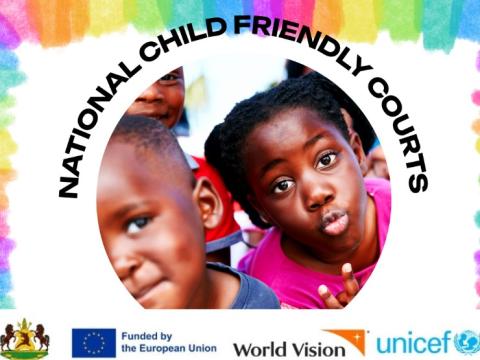Lesotho Launches Newly Renovated Child-Friendly Courts, Strengthening Justice for Children

FOR IMMEDIATE RELEASE
21 January 2025
Lesotho Launches Newly Renovated Child-Friendly Courts, Strengthening Justice for Children
Maseru, Lesotho – Today marks a monumental step in the fight to protect children’s rights and ensure justice for the most vulnerable in Lesotho. The Citizen Voices Addressing Violence Against Children (CVAVAC) project, funded by the European Union in Lesotho and managed by World Vision Ireland in partnership with World Vision Lesotho, will officially launch the newly renovated child-friendly courts in partnership with the Lesotho Judiciary in a ceremony held at the Maseru High Court.
This three-year initiative, launched in February 2022, has been a driving force in empowering communities, advocating for systemic improvements in the justice sector, and addressing violence against children.
Transforming Justice: Child-Friendly Courts
As part of the CVAVAC project, five (5) district courts have been renovated to create welcoming, safe spaces for children and their families navigating legal proceedings. These child-friendly courts, located in Maseru, Leribe, Berea, Mohale’s Hoek, and Thaba-Tseka, feature:
Dedicated waiting areas for children and their families.
Play therapy tools, including anatomic toys, to aid children in sharing their experiences.
Video conferencing systems, ensuring privacy and accessibility.
Comfortable, child-appropriate furniture for justice sector staff and children.
These improvements are designed to prioritize the dignity and well-being of children, reducing the emotional burden of court processes and making justice accessible to all.
Milestones of the CVAVAC Project
Over the past three years, the CVAVAC project has achieved remarkable outcomes, including:
Training 284 Youth CVA Leaders and 164 Adult Community Leaders to lead advocacy campaigns on child rights and justice issues across seven targeted districts.
Promoting public awareness and media campaigns supporting the enactment of child-focused bills, such as the Counter Domestic Violence Act (2022), the Initiation School Bill, and amendments to the Child Protection and Welfare Act.
Equipping justice sector authorities with skills in child-appropriate services and restorative justice practices.
A Milestone Event
The launch event not only serves as the official handover of these child-friendly courts to the Judiciary but also as an opportunity to highlight the project’s achievements through a public awareness campaign. These courts represent a significant step forward in ensuring that children in Lesotho have access to justice in a manner that upholds their dignity and well-being. This is not just an investment in infrastructure but an investment in the future of our nation.
As the CVAVAC project approaches its conclusion in February 2025, its legacy will live on in the structures it has built, the systems it has influenced, and the lives it has impacted. World Vision Lesotho remains committed to advocating for the rights of children and strengthening partnerships to fight violence against children.
ENDS.
Note to editor :
For more information contact: Lerato Brown, Communications and Marketing Manager, World Vision Lesotho, lerato_brown@wvi.org +266 58911020
About World Vision
World Vision is a Christian humanitarian organisation dedicated to working with children, families, and their communities to reach their full potential by tackling the root causes of poverty and injustice. World Vision serves all people, regardless of religion, race, ethnicity or gender. For more information, please visit www.wvi.org/lesotho or follow us on Twitter | Facebook | LinkedIn
About CVAVAC
The Citizen Voices Addressing Violence Against Children (CVAVAC) project, funded by the European Union and implemented by World Vision Ireland and World Vision Lesotho, focuses on empowering communities and improving the justice sector for child rights protection. It has been implemented in 14 Area Programs across eight districts in Lesotho, reaching even the most rural and hard-to-reach areas.